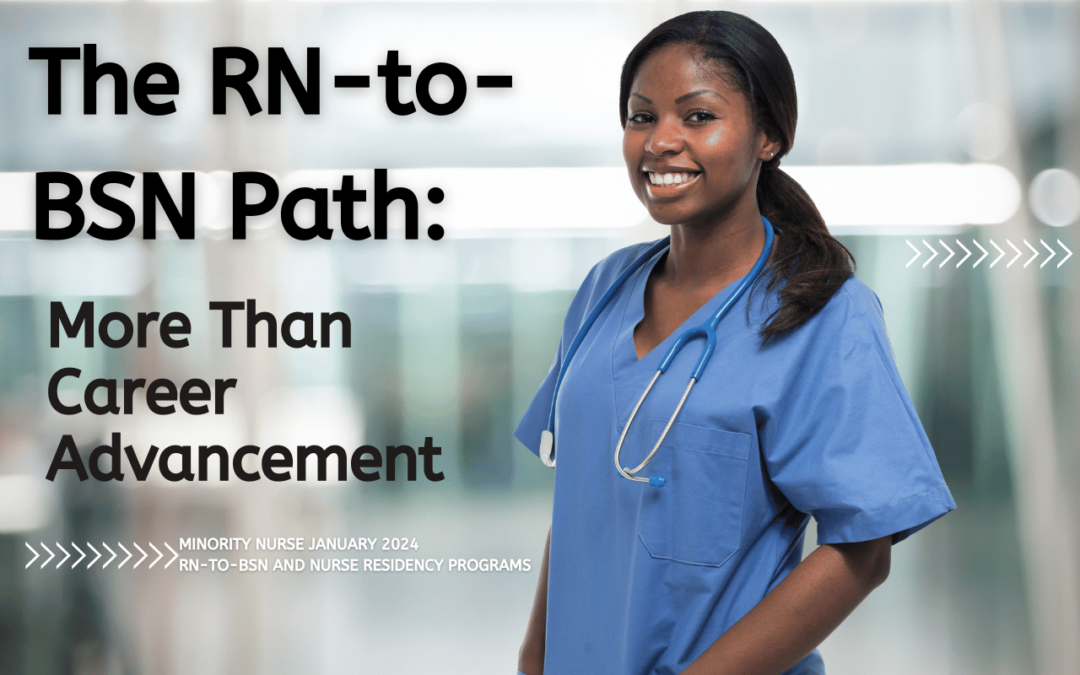Nurses gain clinical and academic experience throughout their careers, all of which combine to form a foundation of essential skills. As the nursing industry continues its drive to have most of its workforce prepared with a baccalaureate degree or higher, many RNs are looking to RN-to-BSN programs.
Whether a nurse has been in the field for 5 or 35 years, or is a nursing student considering the best path, baccalaureate degree programs offer additional training in areas that develop critical thinking skills and are proven to bring better patient outcomes with further gains in leadership, research, and community health.
According to the American Association of Colleges of Nursing’s (AACN) The Impact of Education on Nursing Practice report,
the number of nurses with a BSN is growing, and positive results follow. Research, including The Case for Academic Progression 2013 report from the Robert Wood Johnson Foundation, consistently shows that patients improve when nurses with a minimum of a baccalaureate degree provide care.“That’s important because, as shown with the previous literature, mortality and morbidity rates decrease with BSN nurses,” says Tammy McClenny, EdD, MSN, RN, a clinical associate professor at the University of West Georgia’s Tanner Health Systems School of Nursing. “That’s significant.”
Additional Education Brings Broad Perspective
When nurses have the RN-based clinical experience to be excellent nurses, they gain the additional BS/BSN broad-scope perspective of nursing care’s impact on community health or national nursing policies, for example, their nursing changes, says McClenny. “You learn more about how to apply what you are learning to what you are doing in practice,” she says.
While improving overall patient outcomes and quality of care, a BSN often changes a nurse’s career trajectory. Michele Lani Bray, DNP, MS, PHNA-BC, BSN, RN, is an assistant professor of population health nursing and program director for the online RN-to-BS program at the University of Hawai’i at Manoa Nancy Atmospera-Walch School of Nursing and says that RNs find the additional education opens up professional and personal opportunities.
“Most hospitals and health departments prefer and only hire BS/BSN nurses,” says Bray. “Advancing your knowledge and skills leads to job satisfaction and career and earnings advancement.”
Attaining a BSN also aligns nurses with the industry standards that are increasingly focused on nurses who are trained with a BS/BSN or higher. However, nurses with an RN might find the thought of returning to school daunting. When they have family, work, and outside interests to juggle, applying for an RN-to-BSN program might need more support. Looking for the right program for your needs is key.
Find the Right Program
Compare programs to find one that will fit your lifestyle and financial abilities while offering a rigorous curriculum that will equip you for the nursing roles and opportunities you want to pursue, says McClenny. Work with your employer to see if educational reimbursement is offered and ask a school about potential financial aid.
Sometimes, the most challenging barrier is making time for an RN-to-BSN program, but it is possible. Many schools offer asynchronous programs in which courses are completed to fit the student’s schedule instead of being held on a specific day and time, says Bray. That helps make an RN-to-BSN program more attainable for nurses with multiple priorities, says McClenny, but online courses are no less rigorous than in-person courses. When considering the schedule that will work best for their time constraints, setting aside sufficient time for coursework is critical to success.
What should you look for in a program? Bray and McClenny say taking the time to compare programs will pay off in the end. Nurses will seek “a curriculum focused on advancing your skills and knowledge to shape you into a well-rounded, culturally competent, critically compassionate nurse, a thoughtful, skilled communicator, and enhances your leadership skills,” says Bray.
McClenny says to look for the program’s flexibility and see if a program overview or introduction is available. Look at program requirements to see if you need to take any courses and what the curriculum offers. Are there opportunities for interprofessional communication and development or real-world experiences to combine your academic knowledge with your clinical skills? McClenny, whose students complete a capstone-like project, says those real-world projects are often when nursing work and educational training help guide students to their passion.
An RN-to-BSN program is more than just what happens in a clinical experience or the classroom. Any academic program should offer nurses opportunities for personal and professional growth for building their network. Whether technical, career-based, or educational, support should be easily accessible to nursing students in the RN-to-BSN program.
Many students returning to school for a BSN are already working and have other responsibilities, so they are balancing assignments with other commitments in tight schedules. Access to someone who can help with a middle-of-the-night technical glitch could be critical to success.
Those tools are necessary because students are more likely to complete a program with support. And no matter how a degree program is delivered, establishing relationships with program advisors and faculty members will also smooth the path. These folks offer support by navigating your educational journey alongside you, says Bray, so they can guide and advise if you need to reduce or increase your course load, shift classes, or find academic support for a particularly challenging subject.
Becoming Part of National Nursing
Many nurses look to an RN-to-BSN program to advance their careers but find an unexpected benefit in promoting and improving the nursing industry. Nurses with additional education are positioned to gain advanced degrees like the MSN or DNP. These nurses represent the industry in a broader stage, can help fill the primary care provider gap, and can help alleviate the nursing faculty shortage. Because nursing makes constant progress in developing evidence-based practices, McClenny says BSN coursework often reflects real-time industry needs. “I ask students, ‘What are your managers, your administrators, your educators looking for from you?’”
With many hospitals and organizations now requiring a BS/BSN, career options expand significantly with the degree. “The AACN and healthcare organizations with Magnet hospital status fundamentally view nurses with BS/BSN as leading to a better quality of care for patients and improved outcomes,” says Bray. “The nurse with a BS/BSN in nursing has greater opportunities to select a position from various nursing settings.”
Read the January issue of Minority Nurse focusing on RN-to-BSN and Nurse Residency Programs here.
Sign up now to get your free digital subscription to Minority Nurse.
- Is the FNP Program Right for You? - April 24, 2024
- WOC Nurses Week Highlights Specialty - April 16, 2024
- Honoring Radiology Nurses Day on April 12 - April 12, 2024



